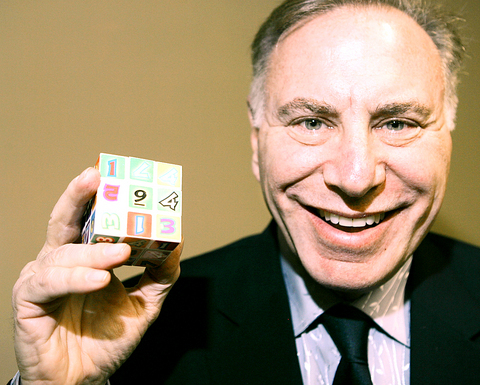A warehouse in middle-of-nowhere northeast Ohio has become the final resting site for hundreds of large metal molds once used to make some long-forgotten toys.
From time to time, toy industry veteran Jay Horowitz uses the molds he has accumulated to resurrect a toy and reintroduces it to the collectibles market, cashing in on its nostalgic value.
But last year, in what he calls a moment of inspiration, Horowitz merged a classic 1980s toy with a recent puzzle fad.

PHOTO: AP
He thinks he has got a major seller on his hands with the Sudoku Cube -- a blend of Sudoku and the Rubik's Cube.
Sudoku, the addictive puzzle craze that originated in Japan, is made up of number grids that require the numbers one through nine to be filled into squares arranged in rows of nine without repeating a number in any line. The Rubik's Cube is a block made of various colored, movable squares that the user tries to line up into solid colors on each side.
Horowitz was peddling his hybrid of Rubik's Cube and the popular puzzle Sudoku to a worldwide audience at the American International Toy Fair last week in New York City.
The Sudoku Cube sells for about US$10 and is more complicated than Rubik's Cube. Horowitz's cube challenges the player to align numbers one through nine on one or more sides or in rows.
The colorful cube is made in China by his newly formed company, American Classic Toy Inc. Retailers carrying the cube include Barnes & Noble, FAO Schwarz and backtobasicstoys.com.
Horowitz has already sold thousands, but he has some competition. There are several other Sudoku cubes on the market. A search on Amazon.com shows two other versions, named Sudokube.
Sudoku fans who feel like they have mastered the paper version -- the puzzle found in most daily newspapers -- have shown interest in the cubed versions, said Adrienne Citrin, spokeswoman for the Toy Industry Association.
"We're seeing that Sudoku and the next phase of brain teasers are becoming increasingly popular," Citrin said. "These cubes are the next level."
Even in an age of video games, Citrin said puzzle games are experiencing a surge of popularity.
"People feel a sense of accomplishment when they've completed the puzzle or the game. We see this as an increasing trend," Citrin said.
The 60-year-old Horowitz has spent years reproducing classic toys like Gaylord the Pup, Howdy Doody and Evel Knievel stunt cycles.
Others still have play value, like American Classic Derby, an arcade-style game where up to four players shoot metal balls to advance a horse to the finish line.
"It's noisy. It's fun for boys," Horowitz said. "You've got to choose the ones appropriate for today's market. There's got to be a reason why it would sell."

Nvidia Corp chief executive officer Jensen Huang (黃仁勳) on Monday introduced the company’s latest supercomputer platform, featuring six new chips made by Taiwan Semiconductor Manufacturing Co (TSMC, 台積電), saying that it is now “in full production.” “If Vera Rubin is going to be in time for this year, it must be in production by now, and so, today I can tell you that Vera Rubin is in full production,” Huang said during his keynote speech at CES in Las Vegas. The rollout of six concurrent chips for Vera Rubin — the company’s next-generation artificial intelligence (AI) computing platform — marks a strategic

REVENUE PERFORMANCE: Cloud and network products, and electronic components saw strong increases, while smart consumer electronics and computing products fell Hon Hai Precision Industry Co (鴻海精密) yesterday posted 26.51 percent quarterly growth in revenue for last quarter to NT$2.6 trillion (US$82.44 billion), the strongest on record for the period and above expectations, but the company forecast a slight revenue dip this quarter due to seasonal factors. On an annual basis, revenue last quarter grew 22.07 percent, the company said. Analysts on average estimated about NT$2.4 trillion increase. Hon Hai, which assembles servers for Nvidia Corp and iPhones for Apple Inc, is expanding its capacity in the US, adding artificial intelligence (AI) server production in Wisconsin and Texas, where it operates established campuses. This

US President Donald Trump on Friday blocked US photonics firm HieFo Corp’s US$3 million acquisition of assets in New Jersey-based aerospace and defense specialist Emcore Corp, citing national security and China-related concerns. In an order released by the White House, Trump said HieFo was “controlled by a citizen of the People’s Republic of China” and that its 2024 acquisition of Emcore’s businesses led the US president to believe that it might “take action that threatens to impair the national security of the United States.” The order did not name the person or detail Trump’s concerns. “The Transaction is hereby prohibited,”

Garment maker Makalot Industrial Co (聚陽) yesterday reported lower-than-expected fourth-quarter revenue of NT$7.93 billion (US$251.44 million), down 9.48 percent from NT$8.76 billion a year earlier. On a quarterly basis, revenue fell 10.83 percent from NT$8.89 billion, company data showed. The figure was also lower than market expectations of NT$8.05 billion, according to data compiled by Yuanta Securities Investment and Consulting Co (元大投顧), which had projected NT$8.22 billion. Makalot’s revenue this quarter would likely increase by a mid-teens percentage as the industry is entering its high season, Yuanta said. Overall, Makalot’s revenue last year totaled NT$34.43 billion, down 3.08 percent from its record NT$35.52